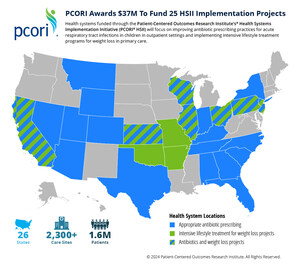PCORI Board of Governors approves $71.5 million to fund new research studies on topics including maternal health, autism, and urinary incontinence
Board also approves $9 million for projects to facilitate uptake of PCORI-funded research results and approves the development of topics for new funding opportunities totaling up to $86 million
WASHINGTON, March 8, 2022 /PRNewswire/ -- The Patient-Centered Outcomes Research Institute (PCORI) Board of Governors today approved several slates of funding awards totaling about $71.5 million to support 12 new comparative clinical effectiveness research (CER) and methods studies. Two of the studies focus on priority topics for PCORI funding, namely reducing maternal morbidity and mortality and improving care for those with intellectual and developmental disabilities.
In addition, the PCORI Board approved nearly $9 million for three projects to facilitate uptake of PCORI-funded research findings in the treatment of urinary incontinence (UI), care of patients with sickle cell disease, and mental health care.
The Board also approved PCORI issuing two new funding opportunities, one focused on health systems strategies to reduce disparities in hypertension management and control and the other on building an evidence base to inform effective strategies for stakeholder engagement in patient-centered CER.
"These latest funding awards reflect PCORI's commitment to address our nation's most critical health issues by funding research that aims to improve healthcare delivery and health outcomes in real-world settings," said PCORI Executive Director Nakela L. Cook, M.D., M.P.H. "The robust data generated through these and other PCORI-funded studies will support patients and those who care for them in making more informed decisions about their care and inform the national dialogue about patient-centered health and health care."
New CER aims to improve outcomes in key areas
A CER study on maternal health will compare ways to improve early detection and management of postpartum complications such as hypertension and depression, including remote monitoring interventions and trauma-informed care. The study will focus on people at risk for experiencing inequities in maternal health outcomes, including Black and Hispanic individuals, people living in rural areas, and those with Medicaid or no insurance.
Another CER study seeks to determine if the medications most often prescribed for attention deficit/hyperactivity disorder (ADHD) are as effective for children who also have a diagnosis of autism as they are for children without an autism diagnosis. The study will also assess the effectiveness of second-line medications.
Three CER studies will compare how well nonsurgical interventions alleviate UI. Two will compare treatment with onabotulinumtoxinA injections, one looking at different doses of the drug among older women for whom anticholinergic medications – long relied on as a standard treatment – are no longer recommended given an increased risk of dementia, and the second comparing onabotulinumtoxinA injections to the oral drug beta agonist mirabegron among women who have unsuccessfully tried more conservative treatments. The third study will compare electronic co-management of UI to care management provided by an advanced practice provider.
Implementation projects facilitate spread and uptake of useful evidence
Projects to facilitate uptake of PCORI-funded research results will focus on:
- Using a health system's electronic health records and a self-treatment program to virtually reach and treat women affected by UI who have not previously sought care.
- Optimizing sickle cell disease care for about 3,500 patients in nine states by deploying an infusion center implementation toolkit and accelerating the implementation of these specialized centers through a facilitation network.
- Implementing a program that matches patients with therapists based on patients' primary mental health concerns and therapists' strengths via the electronic health records of about 50 mental health centers reaching 60,000 patients across 30 states.
Details of these and all other studies and projects approved for funding are on PCORI's website. All funding awards were approved pending a business and programmatic review by PCORI staff and the issuance of formal award contracts. With these latest awards, PCORI will have invested more than $3.2 billion to fund patient-centered CER and support other projects designed to enhance CER methods and the infrastructure necessary to conduct CER rigorously and efficiently.
Targeted funding to improve engagement in research, hypertension disparities
In addition to the approval of new award slates, the Board also approved PCORI's development of two Targeted PCORI Funding Announcements to be released in May. One funding announcement will offer up to $50 million to fund studies comparing the effectiveness of strategies that health systems can take to reduce disparities in hypertension management and control.
Another opportunity will offer up to $36 million to fund research that advances the science of engagement – the systematic study of methods for and outcomes of engagement of patients and diverse stakeholders as partners in the research process to improve the quality of patient-centered CER. Funded awards will address significant evidence gaps, such as which engagement techniques are most effective among historically underrepresented populations and how to best define or measure engagement.
"Over the past decade, PCORI has transformed how research is conducted by requiring meaningful involvement of and partnership with patients and other stakeholders in the research it funds, from planning to conduct the study to ultimately disseminating study results," said Cook. "With this targeted funding announcement, PCORI will build the rigorous evidence available to improve engagement in research across the healthcare enterprise and advance our National Priorities for Health."
About PCORI
The Patient-Centered Outcomes Research Institute (PCORI) is an independent nonprofit organization authorized by Congress in 2010. Its mission is to fund research that will provide patients, their caregivers, and clinicians with the evidence-based information needed to make better-informed health care decisions. PCORI is committed to continuously seeking input from a broad range of stakeholders to guide its work.
SOURCE Patient-Centered Outcomes Research Institute

WANT YOUR COMPANY'S NEWS FEATURED ON PRNEWSWIRE.COM?
Newsrooms &
Influencers
Digital Media
Outlets
Journalists
Opted In



Share this article